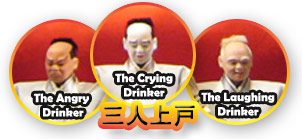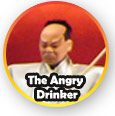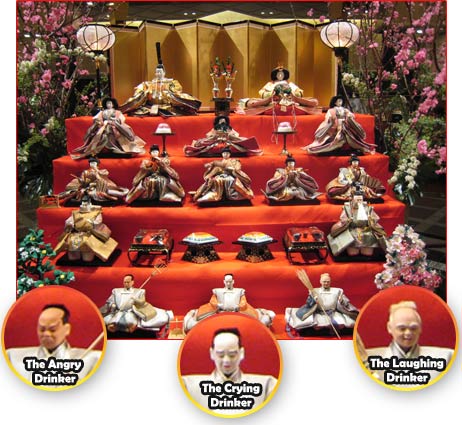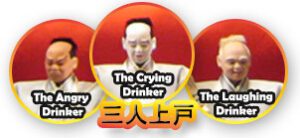
怒り上戸 + 泣き上戸 + 笑い上戸 =
三人上戸
People react to alcohol in different ways. As one would expect from a country in the middle of a love affair with beer, there are words to describe the drinker’s temperament.

怒り上戸 okori jougo – the angry drinker
The person whose quarrelsome nature is perfected by booze.
あの人は怒り上戸なので、いっしょに飲みに行きたくない。
ano hito wa okorijougo nanode, isshoni nomi ni ikitakunai.
That guy gets upset when he drinks; I don’t want to go drinking with him.

泣き上戸 naki jougo – the crying drinker
The person most likely to need a bartender named “Joe” and a shoulder to cry on is a 泣き上戸.
あの人は泣き上戸で、ちょっと酒を飲むと、すぐに自分の悩みの一部始終を話し始める。
ano hito wa nakijougo de, chotto sake o nomu to, sugu ni jibun no nayami no ichibushijuu o hanashi hajimeru.
That crying drunk, after just a few sips, starts laying out every detail of his sad life.

笑い上戸 warai jougo – the laughing drinker
The jolly ole fellow who makes all the drunks laugh and designated drivers cry is called a 笑い上戸.
普段は全然笑わないまじめな社長なのに、酔うといつも笑い上戸になる。
fudan wa zenzen warawanai majime na shachou nanoni, youto itsumo warai jougo ni naru.
The company boss is usually a humorless prude, but when drunk, he is the life of the party.
上戸 jougo – a drinker
So why “jougo?” Glad you asked. Literally of course this is 上 up + 戸 door. The opposite, 下戸 geko (notice the “ko” not “go”) means “a nondrinker.” (If you are offered a drink and you don’t wish to partake, you can say, “下戸のほうです。 I’m not much of a drinker.”)
Of course up or down + door doesn’t help us much, does it?
Way back in the Nara or Heian period (about a thousand years ago), each household had to report how many men they had of adult age. The houses with few males were labeled, 下戸 geko; those in the middle were 中戸 chuuko; and those with the highest testosterone levels were labeled 上戸 jougo.
According to this site, the breakdown was as follows:
- 上戸 6~7人
- 中戸 4~5人
- 下戸 2~3人
Naturally, the houses with more adult males would consume more adult beverages. And the term “jougo” came to refer to drinkers in general.
Although jougo is associated with drinking, you can use 泣き上戸 naki jougo to mean someone who cries during her fortieth viewing of E.T. and 笑い上戸 warai jougo for someone who laughs too loudly at knock-knock jokes.
Hina Matsuri Dolls

During the Hina Matsuri on March 3rd, families with girls display the hina dolls like the above photo. The fifth row from the top has our three heros: 怒り上戸、泣き上戸、 and 笑い上戸. Together, they are… 三人上戸 sannin jougo – the three drunks!
Extra Credit:
空上戸 sora jougo – face doesn’t show when drunk
盗人上戸 nusubito jougo – someone who like to drink and eat sweets and whose face doesn’t show when drunk
隠者上戸 inja jougo – “hermit drinker” – someone who enters his own world while drinking





